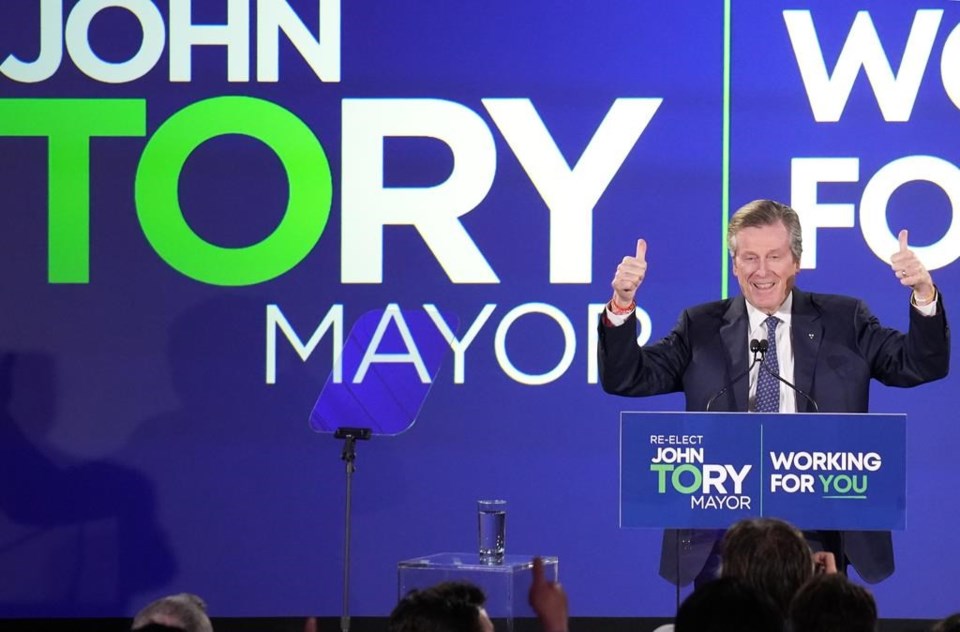TORONTO — John Tory secured a strong third mandate as mayor of Canada's most populous city on Monday, after a campaign that saw him tout his years of experience in Toronto's top office in his bid for re-election.
Tory, who thanked residents for granting him another term, beat out 30 mostly unknown candidates after many criticized his record on transit and housing – two issues he highlighted as priorities.Â
"We have unfinished business that I'm absolutely determined to see though," he told cheering supporters at a downtown hotel in his election night speech.Â
"I asked for a strong mandate and that is what I've been given."
Tory secured about 62 per cent of the vote compared to about 18 per cent for progressive urbanist Gil Penalosa, who came second according to unofficial election results. Tory won with about 63.5 per cent of the vote in 2018.
The newly re-elected mayor said he would work with the federal and provincial governments to get more housing built, along with also focusing on other priorities like affordability and economic recovery from the pandemic, saying he wants the city to "fashion the kind of recovery that leaves nobody behind."
Tory, 68, stressed his intention to keep "hate and division" seen elsewhere in the world out of city politics.Â
"I will continue to lead in a positive way which unites," he said. "There is no room in this city for the kind of hate or bitterness and division that some prefer for their own purposes."
Tory's win comes as he's faced criticism about the state of Toronto under his leadership.Â
Opponents noted the high cost of housing, aging infrastructure, overflowing garbage bins and shuttered parks. Penalosa, Tory's main challenger, had said he was motivated to run after talking with residents who felt the city was "falling apart."
In his concession speech, Penalosa highlighted the trend of Toronto residents being driven out of the city due to the high cost of living. The urban planner also commented on dissatisfaction among residents of all demographics.
"Everybody thinks it's good, but for someone else," he said of the city’s voters. "John Tory has the opportunity in the next four years to make it good for everyone."
Tory's housing plan aims to address the city's housing shortage in several ways, including by permitting more "missing middle housing," which includes duplexes and small apartment blocks, and making it easier to build mid-rise apartments along major transit corridors.
He's also proposed to streamline the building process with the creation of a new division at city hall and plans to ask the province to allow the city to enact a "use it or lose it" policy that would mandate developers to start building on approved but undeveloped land or face higher taxes and have zoning approvals expire. Â
Tory has hinted at the possibility of using new so-called strong mayor powers granted by the province to the leaders of Toronto and Ottawa to pass some of his proposed housing plan if it faces opposition.
The re-elected mayor's other campaign promises included a pledge to keep taxes below the rate of inflation and a commitment to the city's $28-billion transit plan, led by the province.
In his third term, Tory will have to deal with the city's estimated $857-million pandemic-driven budget shortfall.
Myer Siemiatycki, professor emeritus at Toronto Metropolitan University, said some of the candidates who ran against Tory were credible, but they didn't have any name recognition.Â
"The election campaign itself was too short a time period for them to become, for the residents of the city, to become familiar with them," he said.
"There were not many opportunities for serious challengers like Mr. Penalosa to get known in the city more widely."
Tory won the mayoral election comfortably, Siemiatycki said, but a number of city council candidates he supported were defeated.Â
"Mayor Tory, in his third term, will have a more challenging time with the city council," Siemiatycki said. "That's going to make for very interesting dynamics for the municipal council over the next four years."
This report by The Canadian Press was first published Oct. 24, 2022.Â
Maan Alhmidi and Holly McKenzie-Sutter, The Canadian Press



